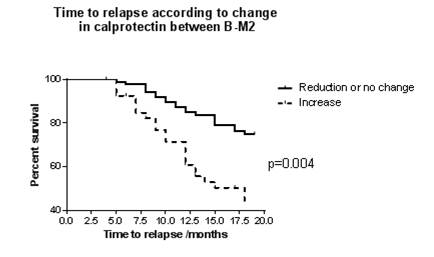Background/Purpose: In ANCA-associated vasculitis (AAV) disease relapses remain common but there are no reliable means to predict them. We previously demonstrated that serum calprotectin levels were elevated during active AAV and that patients in the NORAM trial who relapsed had higher levels during initial presentation with active AAV than non relapsers. The objectives of this study were to validate calprotectin as a biomarker of relapse using samples from the Rituximab in ANCA-associated Vasculitis (RAVE) trial.
Methods: Serum samples were obtained from 182 subjects enrolled in the RAVE trial at baseline (B), 1 month (m1), and 2 months (m2) following enrollment and initiation of treatment. Serum levels of calprotectin were evaluated by ELISA. Absolute calprotectin levels and changes in levels from B to m1 or m2 and between m1 and m2 were calculated for subjects and stratified according to subsequent disease relapse by 18 months of follow-up.
Results: Serum levels of calprotectin were similar between relapsers and non-relapsers (NR) at B and m1, but at m2, levels were significantly higher in relapsers (relapsers median 4750 ng/ml, range 1364-26071 vs non-relapsers 3769 ng/ml, 1020-9964; p=0.04). There was no correlation between calprotectin and ANCA titer or CRP, and only weak correlation with white cell count (r=0.27, 0.3, 0.38, at B, m1, and m2 respectively, all p<0.0003). The percentage reduction in levels between m1 and m2 were significantly lower in relapsing patients compared to non-relapsing patients (relapsers +9.7% vs non-relapsers -9.8; p=0.035) confirming that relapsing patients failed to suppress calprotectin to the same extent as non-relapsers. Time to relapse was significantly faster in those patients with an increase in calprotectin between B and m2 or between m1 and m2, when compared to those in whom levels showed no change or reduction (p=0.0004 and p=0.04 respectively) [Figure].
Conclusion: Failure to suppress calprotectin following induction AAV treatment is associated with greater and faster rates of disease relapse. These findings have now been confirmed in two independent cohorts. Calprotectin may be a biomarker predictive of relapse in AAV and should be investigated for use in clinical trials and clinical practice.
Disclosure:
J. B. Draibe,
None;
R. J. Pepper,
None;
P. A. Merkel,
Genentech and Biogen IDEC Inc.,
2,
Bristol-Myers Squibb,
2,
GlaxoSmithKline,
2,
Actelion Pharmaceuticals US,
2,
Actelion Pharmaceuticals US,
5,
Sanofi-Aventis Pharmaceutical,
5,
Chemocentryx,
5;
A. D. Salama,
None;
F. T. RAVE-ITN Investigators,
None.
« Back to 2014 ACR/ARHP Annual Meeting
ACR Meeting Abstracts - https://acrabstracts.org/abstract/serum-calprotectin-and-disease-relapse-in-anca-associated-vasculitis/

